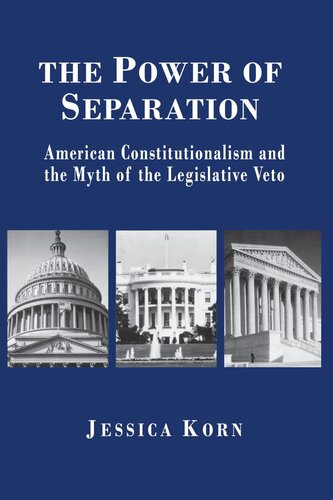

Most ebook files are in PDF format, so you can easily read them using various software such as Foxit Reader or directly on the Google Chrome browser.
Some ebook files are released by publishers in other formats such as .awz, .mobi, .epub, .fb2, etc. You may need to install specific software to read these formats on mobile/PC, such as Calibre.
Please read the tutorial at this link: https://ebookbell.com/faq
We offer FREE conversion to the popular formats you request; however, this may take some time. Therefore, right after payment, please email us, and we will try to provide the service as quickly as possible.
For some exceptional file formats or broken links (if any), please refrain from opening any disputes. Instead, email us first, and we will try to assist within a maximum of 6 hours.
EbookBell Team

5.0
98 reviewsJessica Korn challenges the notion that the eighteenth-century principles underlying the American separation of powers system are incompatible with the demands of twentieth-century governance. She demostrates the continuing relevance of these principles by questioning the dominant scholarship on the legislative veto. As a short-cut through constitutional procedure invented in the 1930s and invalidated by the Supreme Court's Chadha decision in 1983, the legislative veto has long been presumed to have been a powerful mechanism of congressional oversight. Korn's analysis, however, shows that commentators have exaggerated the legislative veto's significance as a result of their incorrect assumption that the separation of powers was designed solely to check governmental authority. The Framers also designed constitutional structure to empower the new national government, institutionalizing a division of labor among the three branches in order to enhance the government's capacity.
By examining the legislative vetoes governing the FTC, the Department of Education, and the president's authority to extend most-favored-nation trade status, Korn demonstrates how the powers that the Constitution grants to Congress made the legislative veto short-cut inconsequential to policymaking. These case studies also show that Chadha enhanced Congress's capacity to pass substantive laws while making it easier for Congress to preserve important discretionary powers in the executive branch. Thus, in debunking the myth of the legislative veto, Korn restores an appreciation of the enduring vitality of the American constitutional order.